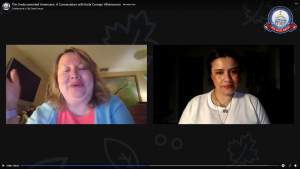Contributed by Samuel Martínez
On the evening of Wednesday, 7 April, El Instituto, together with the Connecticut Democracy Center at the Old State House (OSH), Hartford, co-hosted a live-streamed conversation with Karla Cornejo Villavicencio, Ecuadorian-American essayist and creative nonfiction writer, moderated by Fany Hannon, Director of UConn’s Puerto Rican and Latin American Cultural Center. “The Undocumented Americans: A Conversation with Karla Cornejo Villavicencio,” focuses on Cornejo’s experiences in writing her celebrated book, The Undocumented Americans, based on her travels across much of the United States to talk to undocumented immigrants about their lives. The book was named one of 20 “must read” books from 2020 by Barack Obama and is a finalist for the National Book Critics Circle Jon Leonard Award for best first book.
After an introduction by OSH Museum Educator, Mariana García, Hannon asked Cornejo to speak about her motivation to write the book. Cornejo answered that the 2016 election changed her attitude toward her art. Before that, as an undocumented immigrant, she did not want her life to be defined by being an immigrant in the ways her parents’ lives had been. After Trump’s ascent, Cornejo said she found courage in James Baldwin’s The Fire Next Time, to write about immigration in ways that did not elide the costs that displacement to the North took from her mental health and that of other out-of-status immigrants. “I knew I had something different to say,” she remarked. “I don’t think that we necessarily have debts to anybody but ourselves, but I know that I could write about immigration in a way that was different than it had been written about before.”
Speaking of the psychological burden of feeling indebted to our parents, Cornejo said, “Our parents have lived lives not necessarily making their own choices or following their own dreams, and it’s a continuation of intergenerational trauma for us to try to repay debts to them and to live a life in not pursuing our own dreams and making decisions that are based on someone else’s decision.”
Cornejo accented the need for younger and older people to care for their mental health: “It means making boundaries with parents, with family; you’re not responsible for everybody. It means acknowledging that there’s intergenerational trauma in our families. … Encourage your parents to seek a sobriety group, or an AA class in Spanish, if you see that they’ve struggled with self-medicating for a while.” Whereas mental health and self-care concepts are already well-integrated into Latinx lifestyles, Cornejo said that there remains a hesitancy of Latinxs to talk about mental illness: “I guess there’s the cultural belief that you really shouldn’t let weakness show, and you associate a lack of an ability to tough it out with weakness, and therefore sensitivity, anxiety, depression, PTSD, addiction, panic attacks, all these things … become scary.” “I think one way we could approach it is by describing them as medical, and as symptoms, rather than a diagnosis.”
Cornejo also shared insights gained from her living among immigrant communities, attending their places of work, worship and leisure, and listening to the stories of their struggles for dignity and justice in the cities of Flint and Miami. “When I traveled across the country, I [became] aware of the different kinds of jobs there are and the different ways of surviving.” Speaking of undocumented immigrants in Connecticut, she commented, “There’s so much undocumented diversity.” “I mean, undocumented immigrants do everything, right?” “I’ve learned a lot about undocumented people in Connecticut.”
About her next directions, Cornejo spoke of having struggled for many years with suicidal ideations, and of lately finding success in treatment for depression. “For the past few months, I have been feeling like I can make goals beyond just finding peace.” “I want to write this very good novel, that I’m working on now. … I’d like to move out of this apartment, and find a house with a backyard for my dog, and I hope to keep on writing the kinds of things that will help other queer kids, help the children of immigrants find a reason to keep going that isn’t their parents, or isn’t helping the community, or just surviving, but something that genuinely brings them some happiness, and not just peace.”
